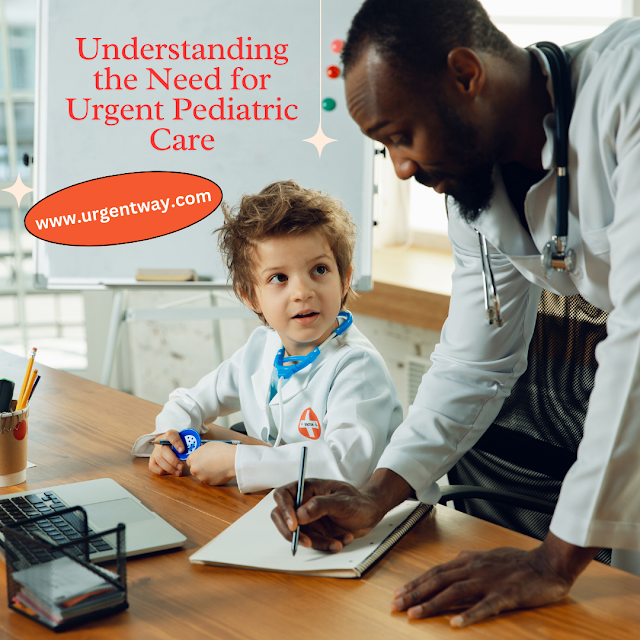A Parent's Guide to Urgent Pediatric Care: Navigating the Path to Quick Healing
When it comes to our children's health, every parent knows that quick and effective medical care is of utmost importance. Children are prone to unexpected injuries and illnesses, and it's crucial to know where to turn when your little one needs urgent attention. Urgent care for kids is a specialized field that caters to the unique needs of pediatric patients. In this guide, we will explore what parents need to know about urgent pediatric care and how to navigate the path to quick healing.
Understanding the Need for Urgent Pediatric Care
Children can be resilient, but they are also vulnerable to a
wide range of injuries and illnesses. From playground accidents to sudden
fevers, parents often find themselves facing situations that require immediate
medical attention. Understanding the need for urgent pediatric care is the
first step in ensuring your child's well-being.

Common Pediatric Urgencies
- Fever:
High fevers in children can be alarming. While most fevers are caused by
viral infections, some may require medical intervention, especially if
they persist or are accompanied by other concerning symptoms.
- Injuries:
Children are naturally active and prone to accidents. Broken bones, deep
cuts, and head injuries are common childhood injuries that may necessitate
urgent care.
- Breathing
Problems: Wheezing, severe coughing, or difficulty breathing can be
signs of respiratory issues such as asthma or allergies, which require
prompt evaluation and treatment.
- Allergic
Reactions: Severe allergic reactions, such as anaphylaxis, can be
life-threatening. Urgent pediatric care is essential to administer
epinephrine and manage the reaction.
- Dehydration:
Young children are particularly susceptible to dehydration, which can
occur due to vomiting, diarrhea, or fever. Prompt rehydration is crucial.
- Burns:
Burns can be painful and pose a risk of infection. Urgent care can provide
appropriate wound care and pain management.
- Seizures:
Seizures in children can be caused by various factors, including fevers or
epilepsy. Immediate medical attention is needed to determine the cause and
provide treatment.
- Infections:
Bacterial infections such as urinary tract infections or ear infections
can escalate quickly in children. Early diagnosis and treatment are vital.
The Role of Urgent Pediatric Care Centers
Urgent pediatric care centers are designed to cater
specifically to the unique needs of children. They are staffed with healthcare
professionals who are experienced in treating pediatric patients, and the
facilities are equipped with child-friendly amenities. Here are some key roles
these centers play:
- Prompt
Evaluation: Urgent care centers for kids provide timely evaluation and
treatment, often without the long wait times associated with emergency
rooms.
- Child-Centered
Environment: The environment is designed to be child-friendly, with
colorful decor, toys, and distractions to put young patients at ease.
- Pediatric
Specialists: The medical staff in these centers are trained to deal
with pediatric cases, ensuring that your child receives specialized care.
- Diagnostic
Services: Many urgent pediatric care centers offer on-site diagnostic
services, including X-rays and laboratory testing, to expedite the
diagnostic process.
- Treatment
and Follow-Up: They provide immediate treatment and guidance on
follow-up care to ensure a smooth recovery process.
Navigating Urgent Pediatric Care: What Parents Should
Know
As a parent, knowing how to navigate the world of urgent
pediatric care is essential for ensuring your child's well-being. Here are some
important steps to keep in mind:
1. Stay Calm
In a medical emergency involving your child, it's natural to
feel anxious and stressed. However, staying calm is crucial. Your child will
look to you for reassurance, and a calm demeanor can help ease their fear and
anxiety.
2. Call Ahead
Before rushing to an urgent pediatric care center, consider
calling ahead. This can help the healthcare professionals prepare for your
child's arrival and advise you on any immediate steps to take.
3. Bring Essentials
When heading to the urgent care center, bring your child's
identification, insurance information, and any relevant medical records. This
will help streamline the check-in process.
4. Explain the Situation
When you arrive at the center, be prepared to provide a
detailed explanation of your child's symptoms and the events leading up to the
urgent care visit. This information will aid in the assessment and diagnosis.
5. Be Involved in the Care
While healthcare professionals will lead the way in your
child's care, it's essential to be involved and ask questions. Understanding
the diagnosis and treatment plan will empower you to provide the best support
at home.
6. Follow-Up Care
After receiving urgent pediatric care, ensure that you
follow any recommended follow-up care instructions. This may include medication
administration, wound care, or further medical appointments.
Urgent care for kids is a specialized field that addresses
the unique healthcare needs of pediatric patients. As parents, it's essential
to understand when to seek urgent care and how to navigate the process
effectively. Choosing the right urgent pediatric care center, staying calm
during emergencies, and following recommended guidelines are key steps in
ensuring your child's swift recovery. While pediatric emergencies can be
stressful, being prepared and proactive can make all the difference in your
child's health and well-being.



Comments
Post a Comment